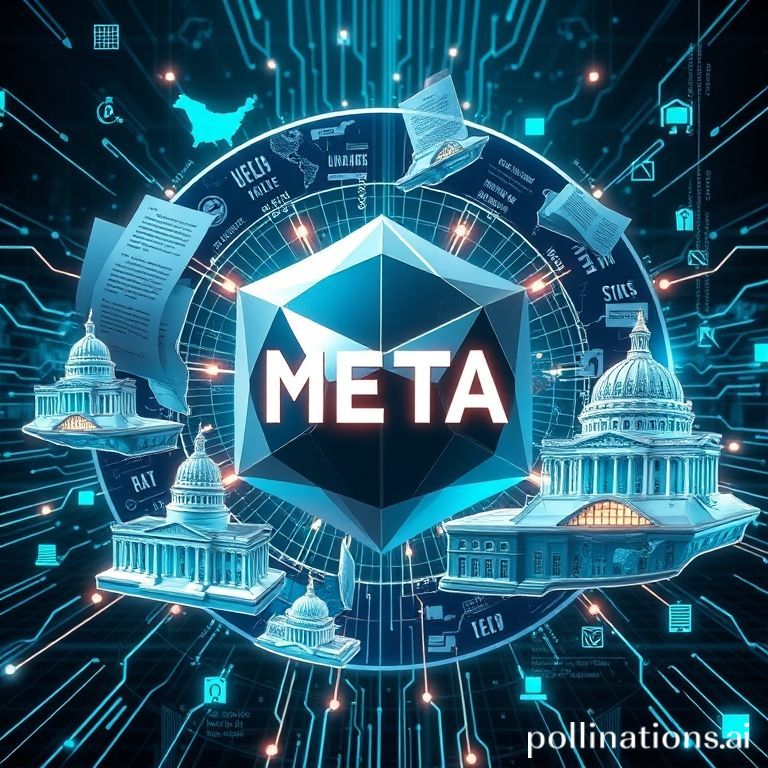
The rapid advancement of artificial intelligence (AI) has sparked a global conversation about its regulation, and in the United States, this debate is intensifying at both federal and state levels. Tech giant Meta is reportedly committing substantial resources, amounting to tens of millions of dollars, to a new super political action committee (PAC) specifically designed to counteract state-level proposals aimed at regulating AI and other emerging technologies. This move highlights a growing strategic effort by major tech companies to influence the legislative landscape surrounding AI, prioritizing a unified federal approach over a fragmented state-by-state regulatory framework.
Meta's initiative, known as the American Technology Excellence Project (ATEP), aims to block what the company perceives as poorly constructed state-level bills. According to statements cited by Axios from Meta spokesperson Rachel Holland, the company believes that such legislation could significantly impede the country's competitive edge in the global AI race, particularly against economic rivals like China. This perspective underscores a central concern for many tech corporations: that an inconsistent and burdensome regulatory environment at the state level could stifle innovation, slow development, and ultimately disadvantage American technology leadership on the international stage.
Beyond simply opposing certain bills, the ATEP super PAC also intends to actively support the election of state-level candidates. These candidates are expected to be proponents of AI development, champions of the U.S. technology industry, and staunch defenders of American tech leadership both domestically and abroad. Brian Rice, vice president of public policy at Meta, emphasized this dual approach of both combating undesirable legislation and promoting supportive political figures. This strategy reflects a comprehensive effort to shape policy from the ground up, ensuring that elected officials are aligned with the industry's vision for AI development and governance.
The sheer volume of legislative activity at the state level underscores the urgency of Meta's efforts. This year alone, a staggering 1,100 state-level tech policy proposals have been introduced across the United States. This flurry of legislative action indicates a widespread recognition among state lawmakers of AI's transformative potential and the need to address its implications. However, for tech companies, this proliferation of bills represents a significant challenge, raising concerns about a fragmented regulatory landscape that could impose varied and complex compliance requirements.
California, a hub of technological innovation, has emerged as particularly active in attempting to regulate AI. Meta has already demonstrated its engagement in the state, reportedly spending $518,000 to lobby against various tech bills during the spring session. This focused effort in California, as detailed by Politico, signifies the state's importance as a bellwether for future AI regulations and a critical arena for the ongoing debate between industry and legislators. The establishment of Mobilizing Economic Transformation Across California, a specific California super PAC, further illustrates Meta's commitment to influencing the state's political trajectory concerning AI innovation.
Tech Industry's Unified Front Against State Controls
The push for federal oversight rather than state-specific regulations is not unique to Meta; it's a sentiment shared broadly across the tech industry. Reports from August indicated that tech companies were continuously pressing the White House and Congress to enact legislation that would pre-empt states from imposing their own AI regulations. The industry's argument is multifaceted. Firstly, they contend that fragmented state laws would create an unmanageable "patchwork" of regulations, making it exceedingly difficult and costly for companies to comply with diverse requirements across different jurisdictions. This could particularly hinder smaller innovators who lack the resources to navigate such a complex legal environment.
Secondly, tech representatives argue that overly broad regulation could inherently slow the development of AI. They advocate for a more nuanced approach, suggesting that regulations should primarily target how the technology is *used* rather than the technology itself. This distinction is crucial for the industry, as it seeks to avoid restrictions that might impede fundamental research and development while still addressing legitimate concerns about misuse or ethical implications. The focus, from their perspective, should be on mitigating harm through application-specific rules, not on stifling the technological progress that drives economic growth and global competitiveness.
The Counter-Arguments: Why States Seek to Act
On the other side of the debate, advocates for state-level legislation present compelling counter-arguments. A primary concern is the perceived failure of the federal government to pass comprehensive AI legislation. In the absence of decisive national action, states argue they have a responsibility to step in and protect their citizens. They highlight the tangible risks that AI poses, including potential harms to consumers through biased algorithms, privacy infringements, job displacement, and challenges to artists and creators whose work might be exploited by AI systems.
Furthermore, these advocates assert that states should retain the autonomy to pass laws tailored to their unique populations and economic contexts. They believe that a "one-size-fits-all" federal approach might not adequately address the specific needs and concerns of diverse communities across the nation. The overwhelming rejection by the Senate (a 99-1 vote) of a proposed 10-year moratorium on state-level AI regulations underscores this sentiment. This decisive vote revealed significant concerns among federal lawmakers about tying the hands of states, particularly given the powerful and potentially disruptive nature of AI technology and the federal government's own slow pace in addressing it comprehensively.
In conclusion, Meta's significant investment in combating state-level AI bills is a clear signal of the high stakes involved in AI governance. It highlights the profound tension between tech industry's desire for streamlined, innovation-friendly regulation and states' imperatives to protect their citizens and assert their legislative authority. As AI technology continues to evolve at an unprecedented pace, the battle over who gets to set the rules—and how those rules are crafted—is set to intensify, shaping the future of artificial intelligence in the United States and its global standing.
